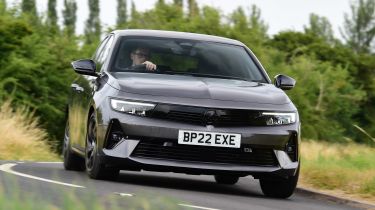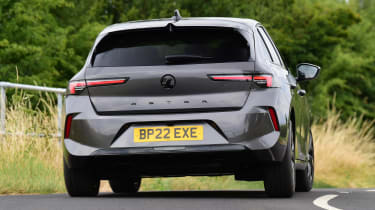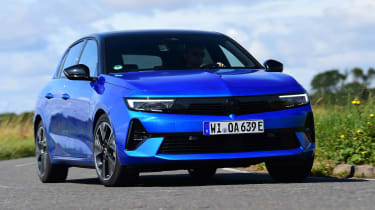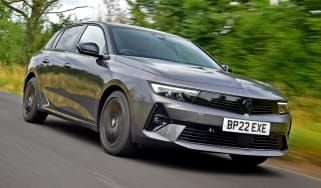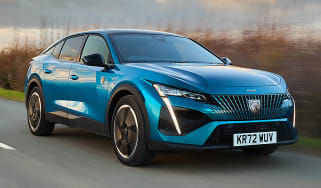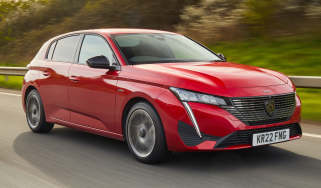Vauxhall Astra review - Engines, drive & performance
"The Astra is surprisingly fun to drive, even if it's lacking a true hot hatch version"
The Vauxhall Astra should offer something for a wide range of buyers, although hot hatch fans may be a bit underwhelmed by the GSe version. Both of the punchy petrol engines offer plenty of flexibility and will appeal to many buyers, while the diesel has now been retired. At the top of the range, the regular and GSe plug-in hybrids provide an excellent blend of performance and efficiency, and a fully-electric Vauxhall Astra Electric also arrived in mid-2023.
To set it apart from the latest Peugeot 308, Vauxhall has tweaked the Astra’s steering, suspension and anti-roll bar settings; as soon as you set off, it’s easy to tell the latest Astra feels much sportier than the old car. The Astra is agile on turn-in, and the steering makes the car easy to place on the road, even if it’s quite light. Its lightness will be a benefit when parking and during low-speed manoeuvres. Of course, this can be somewhat fixed by putting the Astra in its ‘Sport’ mode; although, doing so can make the steering overly cumbersome around town.
Rivals like the Mazda3 and SEAT Leon offer keen drivers a touch more involvement, but the Astra gets fairly close to them. It’s easily capable of back-to-back direction changes, and there’s a secure feel and a pleasing lack of body roll in corners. However, this results in a firm ride, especially on the largest 18-inch alloy wheels.
The GSe version is the hottest Astra on sale, but it takes a different approach to the old Vauxhall Astra VXR. While that was fitted with a thirsty turbocharged 2.0-litre petrol engine and wide, grippy tyres, the Astra GSe uses a plug-in hybrid powertrain and only looks subtly different to the regular model.
More reviews
In-depth reviews
- Vauxhall Astra review - striking hatchback with updated tech
- Vauxhall Astra Sports Tourer review - versatile family estate
- Vauxhall Astra Electric review - household name with an EV twist
- Vauxhall Astra hatchback review (2015-2021)
- Vauxhall Astra Sports Tourer estate (2016-2021)
Used car reviews
It’s also fitted with chassis upgrades, helping it to feel more engaging along a winding road. They work to an extent, but the GSe weighs just over 1,700kg – a similar weight to an executive estate car – and this makes it feel less nimble than petrol hot hatch rivals such as the Ford Focus ST on a twisty road. It remains reasonably comfortable too, and while that’s no bad thing, it means there’s the nagging feeling Vauxhall could have taken things a step further for the hot GSe version.
Vauxhall Astra petrol engines
Carried over from several Vauxhall, Peugeot, Citroen and DS models, the 1.2-litre petrol produces 128bhp. It’s a little punchier than the discontinued 108bhp version without sacrificing any fuel efficiency. Zero-to-62mph takes 9.7 seconds, broadly matching the last Astra. You’ll have no trouble keeping up with traffic, but it won’t provide quite the same kick as the equivalent 1.0-litre EcoBoost Ford Focus.
The 128bhp petrol feels a good match for the GS trim, making the Astra feel sprightly. There’s a little engine noise from the three-cylinder unit, but it never becomes unacceptably loud and it pulls strongly from low revs. The manual gearbox has a slightly long throw when you’re changing gears; the smooth eight-speed automatic is a good alternative.
While it’s badged as a ‘Hybrid’, the model above this is more of a mild-hybrid, and gains an extra 6bhp compared with the standard petrol. The electric motor merely takes some of the strain off the engine to improve fuel economy, and it’s only available with the eight-speed automatic transmission.
Hybrid engine
With a 1.6-litre petrol engine and an electric motor, the Vauxhall Astra plug-in hybrid is the most powerful model in the regular lineup. A combined output of 178bhp and more torque than the diesel had should allow it to sprint away, but it’s pegged back by the weight of the batteries. Accelerating from 0-62mph takes 9.3 seconds, which should be quick enough for most hatchback buyers.
As long as there’s enough charge in the battery, the Astra PHEV will start in electric mode, and settings let you choose between power sources or let the car decide. The switch between petrol and electric power is pleasingly muted, although keep your foot down on the accelerator and the engine noise does become a little loud.
The plug-in hybrid is the heaviest version of the Astra, and our test car felt rather firm. That could be an issue on UK roads, which aren’t known for their smoothness. We also noticed there was a lot of tyre rumble at normal speeds in the car we tested. This was somewhat alleviated during our drive of the 1.2-litre petrol, however; the car felt much more nimble than its PHEV counterpart, while it simultaneously absorbed larger bumps more effectively.
The GSe version uses an upgraded version of the PHEV powertrain, now producing up to 222bhp. That’s enough to see it get from 0-62mph in 7.5 seconds, which is competitive with the Volkswagen Golf GTE and Peugeot 308 Hybrid 225. However, the engine feels rather strained when asked to deliver its maximum acceleration – with a coarse sound that’s not especially sporting – and its eight-speed automatic gearbox has a tendency to change up rather early.
Driven at a relaxed, or even moderate pace, the GSe makes a convincing mile-muncher that’s happy to switch between its electric and petrol motors as your speed increases and decreases. However, it does less well at justifying its GSe badge, even in Sport mode.
Electric motor
The first pure electric Astra has a 152bhp electric motor powering the front wheels, which is enough power for a 0-62mph of 9.2 seconds. While it doesn’t exactly push you back into the seat like a Tesla Model 3, we’d describe its performance as smooth and sufficient for a family car. It should also suit drivers who are making the switch to an EV from a petrol or diesel model, and who aren’t used to lightning-fast acceleration.
Acceleration is plentiful around town but starts to tail off as you reach motorway speeds. Speak of which, refinement is good at the national speed limit, with impressively little wind noise to spoil the hush inside the cabin. Like the petrol Astra, the Electric feels reasonably agile, with not too much body lean and a settled ride, despite its standard 18-inch alloy wheels. Different driving modes are available, but it’s a shame that even when ‘B’ is selected by the gear toggle, brake regeneration isn’t strong enough for one-pedal driving.
Diesel engine
It's now been discontinued, but when available, the sole 1.5-litre diesel engine producing 128bhp was the slowest to accelerate on paper, with 0-62mph taking 10.6 seconds. However, there was also more torque than the smaller petrol engine, so it could feel a bit quicker when accelerating in real-world traffic. The petrol and diesel engines both come with a six-speed manual gearbox as standard, and an eight-speed automatic gearbox is available as an option.
Which Is Best?
Cheapest
- Name1.2 Turbo 130 Griffin [Tech Pack] 5dr
- Gearbox typeManual
- RRP£26,590
Most Economical
- Name1.6 Plug-in Hybrid 195 GS 5dr e-DCT7
- Gearbox typeSemi-auto
- RRP£36,035
Fastest
- Name1.6 Plug-in Hybrid GSe 5dr e-DCT7
- Gearbox typeSemi-auto
- RRP£38,665

